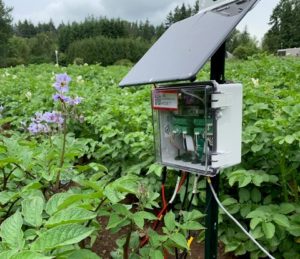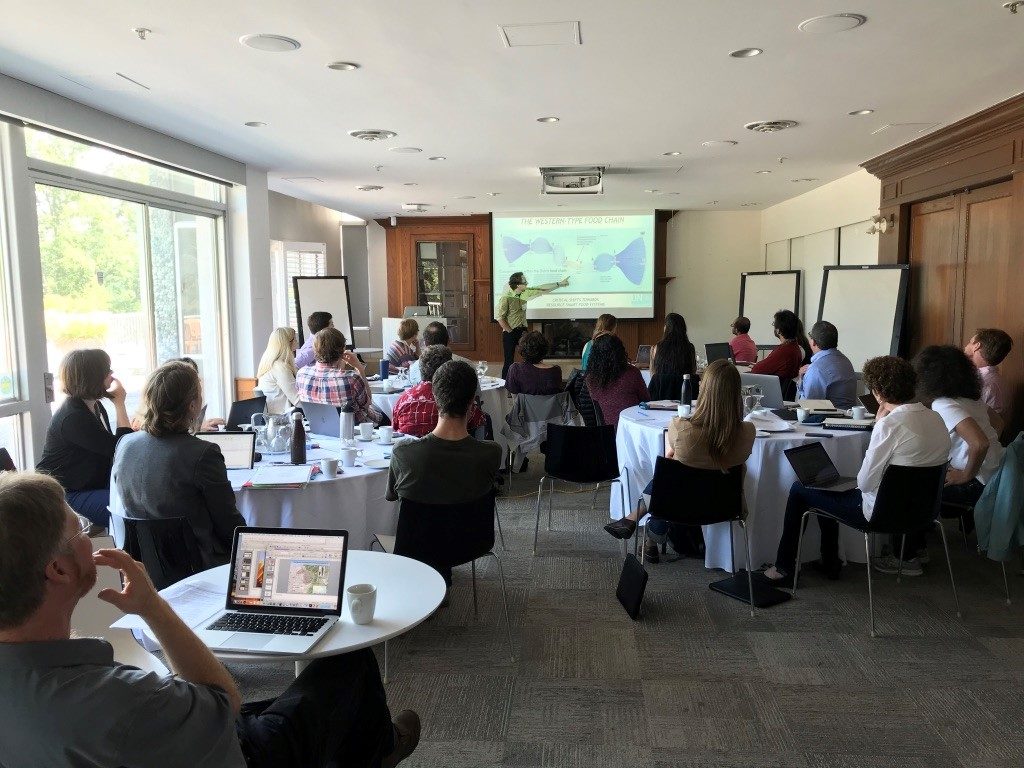
At the dinner table, do you stop and think about the resources needed to produce the food on your fork? That bite of broccoli, for example, grew from clean water, rich soil (to deliver nutrients), and a variety of insects and animals (for pollination, fertilization and pest control).
It also needed human resources — knowledge and labour to plant, care for, and harvest a wide variety of foods that were then packaged and shipped from field to your fork.
Charting a pathway towards a sustainable food system in a way that is holistic and multidisciplinary is the goal of UBC’s Diversified Agroecosystems Research Cluster. The cluster brings together researchers based at 11 campus farms in North America, and counts on active collaborations among 40 scientists who share their diverse expertise to make agriculture more resilient to climate change.
The cluster’s epicenter is UBC Farm, located at the southern end of the UBC Vancouver campus. UBC Farm is managed by the Centre for Sustainable Food Systems (CSFS), part of the Faculty of Land and Food Systems. Dr. Hannah Wittman, Professor in Land and Food Systems and Academic Director at CSFS, and Dr. Zia Mehrabi, Research Associate in the Faculty of Science are the cluster leads.
The Diversified Agroecosystems Research Cluster has enabled scientists to use a multidisciplinary approach to understand the ecological and social drivers of climate resiliency, biodiversity conservation, and social justice in agriculture. One exciting area of innovation is introducing more technology tools to drive decision-making.
“In the long run, our plan is to keep working with cluster members and their networks to build a digital experimental monitoring network to inform data-driven agroecology,” says Dr. Laura Morillas, Research Manager at the CSFS at UBC Farm.
“UBC Farm is a space where we can test new sensors, technologies and participatory, farmer-driven methodologies, to create monitoring protocols and management tools for farmers.”
While information technology has been adopted on some larger commercial farms focusing on a limited range of commodity crops, it is relatively new for smaller and diversified farms. Data-driven agroecology allows farmers to observe, measure and respond in real time to crop and climate variabilities so they can sustain their livelihoods, feed people, and contribute to ecosystem services that support food production, such as biodiversity conservation.
“Small- to mid-sized farms often do not have the capacity, in terms of time and equipment cost, to generate the data they need to support data-driven decision making,” said Dr. Morillas. “We are aiming to develop and test open-access, low-cost options.”
UBC Farm acts as a living lab for researchers. For instance, two projects — one on water sustainability and another on biodiversity monitoring — that draw from the cluster network are taking place there.
UBC Farm a Living Lab: Water Sustainability
Agriculture accounts for 70 per cent of global water allocations, placing water at the centre of issues related to sustainable food production.
Dr. Mark Johnson is piloting an agricultural water use data system at the 24-hectare UBC Farm. He will use the other research farms in the cluster as test beds, particularly in regions that are facing serious water challenges.
Sensors powered through small solar panels combined with data connectivity, visualization and analytics will help UBC Farm develop improved irrigation and post-harvest water use strategies. He has taken great pains to develop a low cost, reliable and easy-to-use system that can be deployed at other farms.
“Measuring the amount of water used in irrigation, together with data on water at different depths in the soil, will help farmers evaluate the effectiveness of their irrigation strategies,” said Dr. Johnson. “We are also tracking the amount of water used to wash produce after harvest to better understand where opportunities lie for improving overall water use in agriculture.”

His team has installed an autonomous soil moisture monitoring network and climate station to check plant water needs, soil water status and climatic conditions.
Dr. Johnson is Canada Research Chair in Ecohydrology and professor with a joint appointment in the Institute for Resources, Environment and Sustainability and the Department of Earth, Ocean, and Atmospheric Sciences in the Faculty of Science.
By evaluating opportunities to reduce water use at UBC, his aim is to transfer this knowledge and affordable technology to planners, regulators and farmers that are trying to meet growing food security issues in the face of climate change.
UBC Farm a Living Lab: Biodiversity Monitoring
One of the approaches of the Diversified Agroecosystems Research Cluster is creating discussion forums that bring together globally linked researchers. In May 2019, the cluster hosted a Peter Wall International Research Roundtable at UBC called Ways of Knowing: Towards Biodiverse and Food Secure Agricultural Landscapes.
Through the workshop, scholars were able to consider new frameworks for “knowing” and assessing the state of biodiversity and food security/sovereignty in their work, including how these important components of sustainable food systems interact with each other.

From that event, cluster members, led by postdoctoral fellow Dr. Matthew Mitchell and Assistant Professor Dr. Juli Carrillo, are refining the key indicators in their Biodiversity Monitoring project.
The team relies upon both automated and manual data collection: acoustic recorders to capture wildlife sounds from amphibians, birds and bats; remote and digital cameras to capture plant phenology (i.e. timing of leaves emerging and flowering) and mammals.
Currently a prototype, this project is expected to be refined and then turned into a biodiversity monitoring system at UBC Farm and other diversified farms linked to the cluster network that will assess how different farm management practices affect biodiversity conservation.
The Diversified Agroecosystems Research Cluster was a result of UBC’s Grants for Catalyzing Research Clusters (GCRC) competition in 2017.
GCRC is a key component of Strategy 6 (Collaborative Clusters) of the university’s strategic plan. By investing in an interdisciplinary research cluster, UBC is supporting systems-wide changes to address climate resiliency in agriculture, as members come from the faculties of Arts, Science, Forestry, and Land and Food systems, as well as from universities across North and Latin America.
“With this cluster, the CSFS is able to use our campus as a test-bed for new research that can be validated among cluster partners, and then mobilized in the UBC community and beyond, to small- to mid-sized farmers, policy makers and other food system stakeholders,” said Dr. Morillas.
“By enabling the growth of interdisciplinary clusters of research excellence, UBC aims to strengthen its societal impact.”